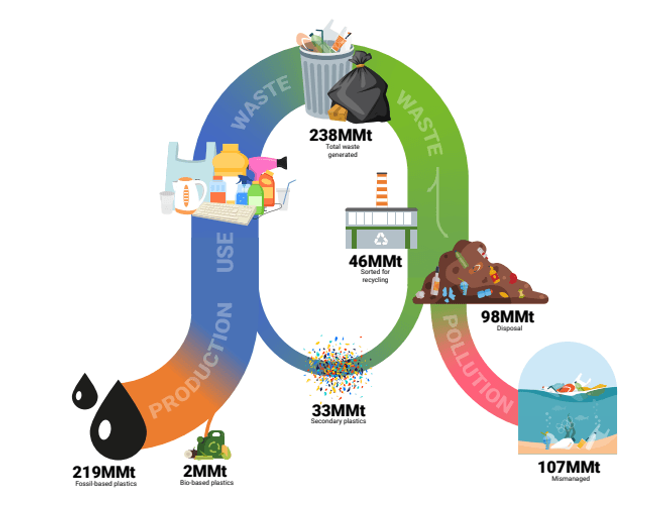A report from the United Nations Environment Programme shows that reducing plastic waste presents a business opportunity, such as through recycling.
Each year, around 400 million tonnes of plastic waste are created.
Whilst 2024 talks in Busan, South Korea did not bring about a plastic treaty the world needs, there is still hope for a reduction in plastic waste.
A report from the United Nations Environment Programme, titled Turning off the Tap: How the world can end plastic pollution and create a circular economy, shows that there is a business opportunity to be found in reducing plastic waste.
At the close of the 2024 plastic pollution negotiations, Inger Andersen, Executive Director of the United Nations Environment Programme, said: “It is clear that the world still wants and demands an end to plastic pollution. Countries, Indigenous Peoples, businesses, industry, youth, scientists, waste pickers and civil society: this is a challenge that unites us all.
“We may be closing this session today, but the world will still be watching tomorrow. Plastic pollution will still be arriving on our shores.
“We are drafting a treaty for the ages. A treaty to protect our environment, our health and our future. Getting this right is critical. And so, our work will continue.”
How a reuse market can reduce plastic waste
UNEP’s report says that creating the enabling environment to ensure the reuse market has a stronger business case than the single-use plastics market.
Reuse systems can provide a reduction of 30% in plastic pollution by 2040, the highest opportunity to reduce this.
This could occur through replacing some of the most problematic and unnecessary products, such as food and beverage packaging or plastic shopping bags.
As of 2024, 91 countries and territories have implemented full or partial bans on plastic shopping bags including China, Italy and Canada.
In the report, Inger says that “only an integrated, systemic shift from a linear to a circular economy can keep plastics out of our ecosystems and bodies and in the economy”.
Recycling to reduce plastic pollution
Accelerating the market for plastics recycling could reduce the amount of pollution by 20% by 2040.
dEnsuring recycling becomes a more stable and profitable venture could make a big difference, but requires an aequate availability of feedstock that can be recycled.
Recycled materials need to be able to compete on a level playing field with virgin materials.
The report says that investment in increased recycling capacity coupled with incentives to use recycled plastic in new products and the manufacture of products that are economically recyclable could trigger the change needed.
Reorienting and diversifying the market
Plastic alternatives struggle to compete in markets with products made of fossil fuel-based polymers, often because of high cost, consumer demand or lack of appropriate regulations.
UNEP says that even with a market transformation approach, a significant volume of plastics cannot be made circular in the short to medium-term and will require disposal solutions.
These solutions could include creating new ways to finance collection and disposal of legacy plastics and creating microplastics from entering the economy and environment.
Anke Boykin, Senior Director Global Environmental Policy at PepsiCo, said: “The momentum is strong. A vast majority of countries support ambitious global rules to address plastic pollution. The political will to take action exists.”
“Progress has been made. Not only in the form of a significantly evolved text but also the debate itself that has reached a new level of depth and nuance. The collective understanding of key issues and needed actions continues to grow.
“There’s more to do. The draft text clearly requires more debate, and crucial concepts like Extended Producer Responsibility (EPR) need clearer definitions and globally agreed principles to address vastly varying interpretations and accelerate EPR implementation.”



